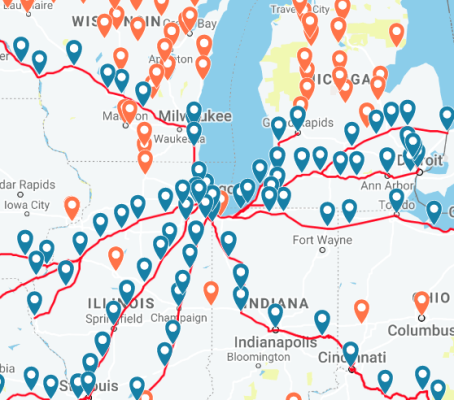I'd agree with the many here - sounds nice in theory, probably not practical for the US at this stage, and the reality is it just isn't going to happen.
But talking about theory - I've sometimes wondered if we couldn't have a couple lanes of major highways with rail tracks built right in (level with the road surface so as to not interfere with regular cars/trucks). You could run a 'train' of semi trailers, maybe built like those repair trucks that have drop down metal wheels for the tracks, and regular tires for the road. Passenger trains would just need the steel wheels and some off ramps and switching back to the opposite lane at a few points.
Yes, you'd need to keep debris out of the wheel track, but probably not insurmountable. And most debris would probably just get crushed/deflected by the wheels anyhow.
-ERD50
As a long time active transportation advocate, I was struck by the same types of comments I have heard for years concerning the near impossibility of people changing their transportation habits. While motor vehicles continue to be the dominant form of transport, it seems clear that when alternatives are built, for biking especially, a significant number of people change their motorized commuting habits.
If motorists were charged the actual cost for using their vehicles, gas tax pays a small part of our roads, more motorists would be investigating other forms of transport.
The reason I quoted ERD50 was his suggestion of using existing infrastructure, like our freeways, to overcome many obstacles. I am not an engineer so I do not know how significant that could impact a project like this but it does work very well for active transportation. In most cases, motorists lose little time when roads are narrowed and non-motorized transport finds a safe place for participants. And, participation for active transportation increases. Most people are surprised when this happens given the 'motorist culture' that people feel will not change.
Speed, on-time performance and safety will make a big difference for the success of train travel. Perhaps 500-1,000 miles should be the limit. But in my experience while living in CT and visiting NY and other cities, the train, was a great option. And, while on trips in Europe, the trains provided outstanding service.
I do not disagree that this is a tough change given our attachment to motor vehicles. But given the positive aspects while 'training' during my east coast experience where I could read a book, drink a beer, enjoy a nap while supporting great environmental and other benefits, makes riding a train a choice that people might make and pay for once developed.

